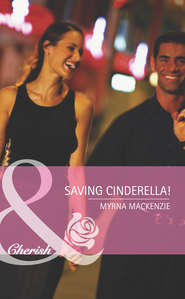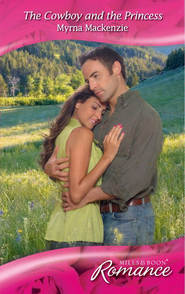По всем вопросам обращайтесь на: info@litportal.ru
(©) 2003-2025.
✖
Inherited: Expectant Cinderella
Автор
Год написания книги
2018
Настройки чтения
Размер шрифта
Высота строк
Поля
“Oops, I’m so very sorry,” she said, reaching out to rub it off. Her slender fingers brushed the back of his hand. As she moved closer, trying to undo the damage, he breathed in the faint scent of lavender, of … woman, and his entire body tightened. Ridiculous. She was a total stranger, and even if she weren’t, he’d made too many mistakes with women. Serious, life-changing mistakes that had left him reeling and had nearly caught others in the crossfire. So … no. Definitely no.
The beauty must have felt the same way, because she quickly jerked her hand away. A pink smudge of cake frosting remained on the sleeve of his suit where her fingertips had slid against him, and he almost felt the small gasp whoosh out of her.
“I’m ninety-nine-percent positive that will come out,” she promised with a blush. “You could give it to me. I could fix it.”
Parker felt an unfamiliar urge to smile, but he restrained himself. There appeared to have been a lot of “fixing” going on, given the fact that the building was supposed to be unoccupied.
But the outcome of this wasn’t going to be fun or funny. He lost the urge to smile. “I think not. We’re done here,” he said.
Those pretty brown eyes blinked. “Excuse me? Does that mean you won’t be having your wedding here?”
“If I were ever going to have a wedding in this lifetime—and I don’t plan to—then no, it wouldn’t be here.”
“Because we’re not up to your style?”
“Because I’ll be selling the building and I doubt that the next owner will leave it intact.”
Parker would have sworn that those big brown eyes couldn’t have opened any wider or looked more distressed, but he would have been wrong.
“Sell the building?” Her words came out on a whisper. “But this is Tillie’s building.”
He thinned his lips. “I assume you’re referring to my aunt Mathilda and she’s …”
“She passed away,” the woman said quietly. “You’re her heir? She had an heir? A real live heir?”
The woman was clearly distressed to learn of his existence … and possibly the fact that he was still among the living. “I’m Parker Sutcliffe,” he said, “and I never met my aunt. And you are …?”
“I’m … well, I’m …” She had a look in her eyes that Parker recognized from experience. She was searching for a good story to tell him, so he gave her his best don’t-even-bother-trying-to-lie icy aristocratic stare, the one he’d learned to use on the servants before he could even talk.
She blew out a breath that lifted those pretty copper bangs, took a deep breath and stood tall, or at least as tall as someone whose head barely reached his shoulder could. “I’m Daisy Lockett. I live here.” She pushed her chin up. “We live here,” she said with a touch of defiance. She gestured toward the woman with the cane, the minister and the organist who were gathered on the other side of the room looking worried.
“You live here,” Parker repeated as if his brain had gone dead. And maybe it had. He’d been expecting an empty building and when it hadn’t been empty he’d assumed that someone was simply borrowing the facilities, but … tenants? And not just tenants but a too-pretty woman with eyes like melted chocolate along with three frail elderly people?
Parker narrowed his eyes. He didn’t care for this turn of events at all. Unpredictable, possibly messy situations were at the bottom of the list of things he liked. After all the drama of the past year and his disastrous personal relationships with women, he was ready for something a bit more boring.
But that was apparently not an option. Parker looked down into those worried dark caramel eyes. Daisy Lockett’s hair looked soft and disheveled, the way a woman’s hair would if a man had just taken her to bed and plunged his fingers into it. She had her index finger between her lips, either nervously chewing on her fingernail or not so nervously licking cake frosting off her pink fingertip.
He caught himself wondering which it was. Stupid. Did it matter? What mattered was that she was living under his roof. Admittedly a roof he hadn’t even known about until last week, but one that he now possessed. Which meant that anything that went on inside this building could be tied to him, and right now—especially now—he didn’t need any bizarre or provocative stories circulating about him.
“My aunt passed away a couple of months ago,” he said. “So why are you still here? And why didn’t the authorities or the real estate agent know that there were people in the building? Would you like to explain all that to me, Ms. Lockett?”
Parker crossed his arms over his chest and frowned down at Daisy Lockett. It was a look that had cowed employees much bigger than she was.
But to his surprise, the woman called his bluff. Tiny as she was, she stood taller. She crossed her arms, too, something which was, he surmised, supposed to make her look fierce, but given the generous curves of her breasts only made her look … interestingly hot.
Stop it, Sutcliffe, he warned himself. The woman’s hotness quotient was the very last thing he needed to be thinking about. He and she were, after all, about to terminate their fleeting acquaintance. She would be leaving just as soon as he could hustle her out of here. And soon enough he would be returning to Boston and his business. A business that, despite its current difficulties, he could depend on and control.
It was obvious that Daisy Lockett was totally out of control. He needed to get rid of her, not examine her more closely.
“Well, Ms. Lockett, what’s your explanation for this?” He held out his hand toward the remains of the sad wedding cake with its toppled plastic bride and groom, several half-used containers of bubbles, a puddle of foaming bubble solution forming on the cheap paper tablecloth and an MP3 player that needed new batteries. The low, distorted tones of a song playing on dying power sounded like a cow in distress.
“You don’t like weddings, do you, Mr. Sutcliffe?” she asked suddenly, not answering his question. “I’ve met men like that before.”
And clearly it hadn’t been a pleasant experience.
He raised one eyebrow. “You’re right. I’m not a huge fan of the institution of marriage, but that’s completely beside the point. The point is that you’re living in my building. Trespassing. What did you think would happen when someone found out you were here?”
She raised her chin. “I just … I hoped it wouldn’t happen.”
He blinked. A good businessman never made decisions based on hope alone. “Well, here I am. It’s happened,” he pointed out. “The question is, now that our paths have crossed despite your best hopes … what am I going to do about you?”
It would still be months before Daisy signed up for her first Lamaze class, but she knew that proper breathing was at the core of the program, so if she were in a class right now, she’d be failing. Fear was playing havoc with her breathing, and she was alternately forgetting to breathe and then having to suck in big gulps of air while trying to appear perfectly calm to this man who claimed to be Tillie’s nephew. The man who also claimed to own this building.
“Tillie never spoke of you,” she said, grasping for a lifeline. Surely Tillie, who had been like a mother to her, and also her best friend in the world, would have mentioned that she had a nephew….
Who looked more gorgeous than any man has a right to look. With great shoulders and great … other stuff, and a deep voice that—
Daisy blinked. What was wrong with her? Seriously. This man wasn’t even nice.
She frowned. “It just seems as if Tillie might have mentioned a nephew if you were her heir,” she said, glad that the man couldn’t read minds. Or … he probably couldn’t. Tillie had always tried to claim she was psychic and that Daisy was as transparent as they come. If this man was related to her …
“My aunt and I never met,” the tall, dark-haired stranger said. “But according to her attorney, she died without a will and I’m her only living relative.”
No. No. No. No. No. That couldn’t be true, but … oh, just look at him. Look at the strong line of his jaw, the arch of his eyebrows. If she were playing a matching game, those features would be a perfect fit for Tillie’s. Still … she needed time. She needed to think, to see if there was some way out of this crazy rabbit hole she’d fallen into when this man had stepped through the door.
“I’m sorry, but I’m going to need more proof than just your word.” Men had told her so many lies over the years, they had hurt her so much. If she was going to get kicked out on the streets—please don’t let me get kicked out—she wasn’t going to go down meekly. Still, the look in those I’m-in-command green eyes told her that he was confident he would win. She tried not to think about what losing would mean for her and her friends and her—
She resisted the urge to curl a protective hand over her abdomen. Panic made breathing even more difficult. Her hands felt clammy.
The man looked decidedly irritated, and Daisy discovered that, even irritated, he looked just as devastating, a fact which really ticked her off. Life could be so unfair sometimes. “I don’t generally carry around those kinds of documents,” he told her with an imperious air.
A small sliver of hope grew within her. Breathe. Breathe. Breathe, she ordered herself. Maybe all of them could be safe for a little while longer.
And maybe a miracle could happen, a beam of light could lift me into an alternate universe where pink unicorns frolic and chocolate bars grow on trees, she chided herself. Or at least to a universe where there were no rich, handsome and, yes, rightful owners with the law on their sides wanting to throw her and hers out on the street. Think, Daisy, think. You need real ammo here. You need to be smart.
Okay. Here was the deal, all that she had. “Tillie was my very best friend,” she said as forcefully as she dared. “She wanted me here. And I have proof, neighbors who will vouch for me.” With the last bit of courage she possessed, Daisy lifted her chin.
The man ran a hand through his hair. Hair that had obviously seen the services of an expensive stylist. He turned those cold, deep-green eyes on her and frowned. “All right, you have me there. I never knew my aunt and I don’t know anyone in Las Vegas. I’m not from here, but I assure you, Ms. Lockett, the law is on my side. I intend to come back and dispose of my aunt’s effects. I’m going to do something with this building, and I’m afraid that you won’t be allowed to stay unless you can provide legal papers that trump mine, the ones that really do exist. I’ll be back tomorrow with proof of ownership, and if you’re still here, I’ll expect there to be a very good reason. A legal reason.”
Daisy looked up into the man’s gorgeous eyes and saw nothing that could give her hope. Tillie had been a total sweetheart, a surrogate mother and a friend, but she had also been a bit of a procrastinator. She’d disliked lawyers and anyone with authority. And like so many people, she’d thought she’d live forever and probably had never even considered making a will. In fact, given Tillie’s spontaneous nature, it would be beyond surprising if she’d left anything legal that could save her friends now. And Daisy wasn’t the only one at risk. Panic—sheer, terrifying panic—ripped through her. The others were too frail and old to deal with this stuff. She had to be the strong one now, the leader, the helper.
So, closing her eyes and biting her lip, she sent one swift wish for guidance into the ether. Reaching out, she touched the man’s sleeve.
“Please don’t send us out on the streets. We have nowhere to go.”
She wasn’t even touching his skin at all, but she felt as if a lightning bolt had ripped through her and left shimmering sparkles of electricity filling the air around her. As if she was somehow electrically linked to this man who was looking at her as if she had just declared that she was going to give birth right in front of him. The fact that that thought wouldn’t be too terribly far from the truth if this was seven months into the future made Daisy blanch, but she held on. “Please,” she added. “Not yet. I’ll … I’ll get proof about Tillie and all of us somehow.”
“All of you,” the man said. “There are more of you?”











